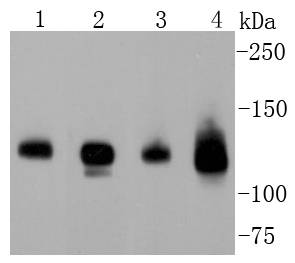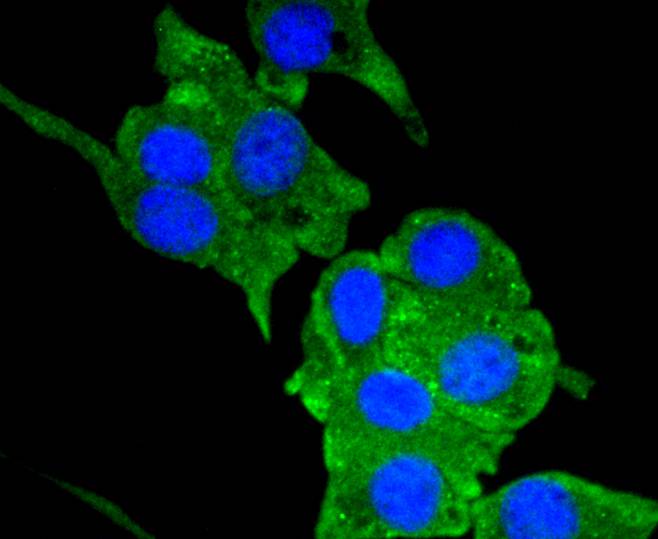Product Name :
Neuropilin-1 polyclonal antibody Background :
Neuropilin is a type I transmembrane receptor that has been implicated in aspects of axon growth and guidance and has been shown to act as a high affinity receptor for class III semaphorins and vascular endothelial growth factor (VEGF). A closely related protein, neuropilin-2, shares a common domain structure and signifcant homology with neuropilin and also acts as a receptor for the class III semaphorins and VEGF. Both neuropilins are involved in regulating many physiological pathways including axonal guidance and angiogenesis, however they exhibit differential expression in the adult vasculature. Neuropilin-2 is polysialylated and expressed on the surface of dendritic cells. It is also expressed by venous and lymphatic endothelium. Neuropilin is expressed predominantly by arterial endothelium. Product :
Rabbit IgG, 1mg/ml in PBS with 0.02% sodium azide, 50% glycerol, pH7.2 Storage&Stability :
Store at +4°C after thawing. Aliquot store at -20°C or -80°C. Avoid repeated freeze / thaw cycles. Specificity :
Neuropilin-1 polyclonal antibody detects endogenous levels of Neuropilin-1 protein. Immunogen :
recombinant protein Conjugate :
Unconjugated Modification :
Unmodification
Neuropilin-1 polyclonal antibody Background :
Neuropilin is a type I transmembrane receptor that has been implicated in aspects of axon growth and guidance and has been shown to act as a high affinity receptor for class III semaphorins and vascular endothelial growth factor (VEGF). A closely related protein, neuropilin-2, shares a common domain structure and signifcant homology with neuropilin and also acts as a receptor for the class III semaphorins and VEGF. Both neuropilins are involved in regulating many physiological pathways including axonal guidance and angiogenesis, however they exhibit differential expression in the adult vasculature. Neuropilin-2 is polysialylated and expressed on the surface of dendritic cells. It is also expressed by venous and lymphatic endothelium. Neuropilin is expressed predominantly by arterial endothelium. Product :
Rabbit IgG, 1mg/ml in PBS with 0.02% sodium azide, 50% glycerol, pH7.2 Storage&Stability :
Store at +4°C after thawing. Aliquot store at -20°C or -80°C. Avoid repeated freeze / thaw cycles. Specificity :
Neuropilin-1 polyclonal antibody detects endogenous levels of Neuropilin-1 protein. Immunogen :
recombinant protein Conjugate :
Unconjugated Modification :
Unmodification
-
 Western blot analysis of Neuropilin-1 on different lysates using anti-Neuropilin-1 antibody at 1/1,000 dilution. Positive control: Lane 1: Mouse heart Lane 2: Mouse liver Lane 3: Mouse kidney Lane 4: Human liver
Western blot analysis of Neuropilin-1 on different lysates using anti-Neuropilin-1 antibody at 1/1,000 dilution. Positive control: Lane 1: Mouse heart Lane 2: Mouse liver Lane 3: Mouse kidney Lane 4: Human liver -
 ICC staining Neuropilin-1 in SHG-44 cells (green). The nuclear counter stain is DAPI (blue). Cells were fixed in paraformaldehyde, permeabilised with 0.25% Triton X100/PBS.
ICC staining Neuropilin-1 in SHG-44 cells (green). The nuclear counter stain is DAPI (blue). Cells were fixed in paraformaldehyde, permeabilised with 0.25% Triton X100/PBS.
Bioworld Biotech only provide peptides for our antibodies and do not provide additional peptide customization services.
Price/Size :
USD 368/1mg/vial
Tips:
For phospho antibody, we provide phospho peptide(0.5mg) and non-phospho peptide(0.5mg).Describe :
Blocking peptides are peptides that bind specifically to the target antibody and block antibody binding. These peptide usually contains the epitope recognized by the antibody. Antibodies bound to the blocking peptide no longer bind to the epitope on the target protein. This mechanism is useful when non-specific binding is an issue, for example, in Western blotting (WB) and Immunohistochemistry (IHC). By comparing the staining from the blocked antibody versus the antibody alone, one can see which staining is specific; Specific binding will be absent from the western blot or IHC performed with the neutralized antibody.Formula:
Synthetic peptide was lyophilized with 100% acetonitrile and is supplied as a powder. Reconstitute with 0.1 ml DI water for a final concentration of 10 mg/ml.The purity is >90%,tested by HPLC and MS.
Storage:
The freeze-dried powder is more stable. For short time at 2-8°C. For long term storage store at -20°C.
Note :
This product is for research use only (RUO only). Not for use in diagnostic or therapeutic procedures.
 Neuropilin-1 polyclonal antibody
Neuropilin-1 polyclonal antibody  Datasheet
Datasheet COA
COA MSDS
MSDS SHIP
SHIP